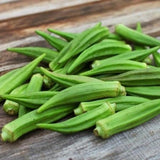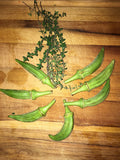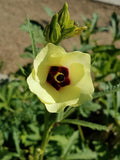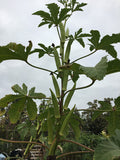Elinitsa Okra (Greece)
Abelmoschus esculentus
These spineless green okra grow on incredibly productive plants. They are named for the ancient remote Village in Greece that they come from. They are a long-standing heirloom which has been grown in this village for more than 100 years.
The plants grow large during the season but begin producing early on. These okra are best picked small as this is the traditional way they are used in Greek dishes. The plants are easier to pick than other commonly found okra varieties in the USA as they are more compact and have less itchy leaves and stems. The okra pods are very tender with a mild unique flavor that fits well in many dishes. They continue to produce heavily throughout the season and out produce other okra varieties around.
Elinitsa is a small mountainous village in the Peloponnese section of Greece. Residents of this lush area fled during wars with Turkey as well as extreme poverty and attacks during World War 2. Most resettled in the USA, Australia, or Athens. A small group of families remained in the village during the 1900's and continued to farm terraces and small field scattered amongst the hills. They have preserved local culture through food, annual festivals, panagiri, and collective work. Wildfires in the 1990s caused another major disturbance to Elinitsa. Villagers worked together to rebuild and preserve a small ancient town center and museum.
Adam Forbes, who is one of our growers for this variety, has ancestral roots in this village. Only about 15 people remain and 95-year-old Giorgios is one of the last farmers in Elinitsa. Giorgios is the seed keeper who has preserved this variety for his entire adult life and he was kind enough to pass on a few seeds to Adam. Giorgios was thrilled to share these seeds and he hopes their story and cultural diversity is preserved. He uses these okra in Bamia Laderes (okra tomato stew), baked okra and tomatoes, briam (a traditional Greek summer vegetable dish) as well as in other soups and stews. Giorgios remembers these okra first being given to his father by his grandfather and has been a favorite of the village for generations. They have produced will in zone 6/7 in the USA as well.
Days to maturity: 55
Seeds per pack: 35
Germination rate: 88% on 01/27/2023
Planting / harvesting notes
Sow seeds of this heat-loving plant indoors 2-3 weeks before transplanting, which should happen several weeks after the last frost, or when soil temperatures stay above 65 degrees Fahrenheit. Soak seeds overnight for quicker germination, and plant 3/4" deep. Space 18" in rows 12-18" apart. Beds should be at least 3' apart as plants tend to bush out widely. Okra likes fertile, well-drained soil with added compost.
Seed keeping notes
Okra is insect pollinated. Isolate different okra varieties by at least 1/8th of a mile (or up to 1/2 mile if you are truly concerned about seed purity) to avoid unwanted cross pollination. Allow pods to grow large and turn brown and woody (your neighbors may look at you funny). When you can hear the seeds rattle, harvest the pod and allow it to dry further on trays in the sun in a dry place. Remove seeds and use breath, wind, or fans to remove bits of chaff.











